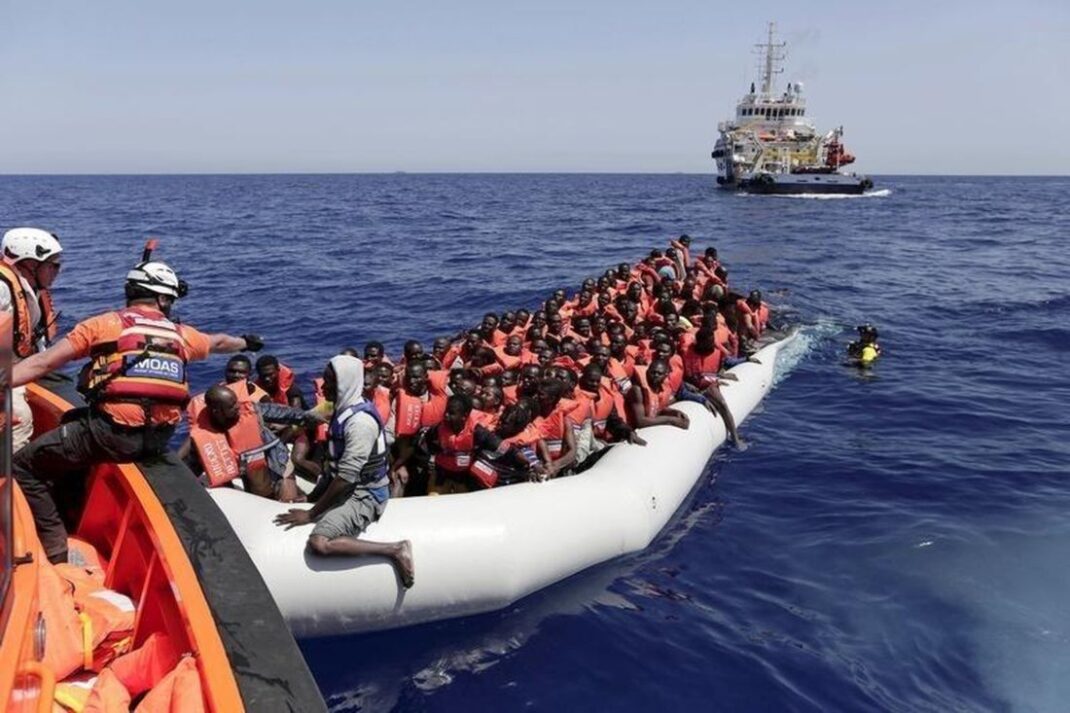Bill Drexel
 Three and a half years after Italian officials launched an aggressive campaign against humanitarian search and rescue efforts off their southern coast, Italian magistrates have finally leveled criminal charges on the NGOs and individuals it targeted for saving lives at sea.
Three and a half years after Italian officials launched an aggressive campaign against humanitarian search and rescue efforts off their southern coast, Italian magistrates have finally leveled criminal charges on the NGOs and individuals it targeted for saving lives at sea.
As we are now learning, the case’s extensive investigation documents also inadvertently include details of Italian officials knowingly leaving migrants to die at sea, and wiretapping humanitarians’ conversations with lawyers and journalists—flagrant violations of international and domestic law.
As a crew member of the first rescue ship searched, seized and impounded by the Italian government back in 2017, I find the recent revelations of Rome’s shameful tactics unsurprising.
Nonetheless, in light of this new evidence it is high time that the Italian government is held to account, rather than the humanitarians it is prosecuting. Humanitarian standards—crucial to supporting the world’s most vulnerable populations—hang in the balance.
Even before the Italian government attempted to criminalize search and rescue operations along the “Central Mediterranean Route”—the world’s deadliest migration passage—rescuing the tens of thousands of migrants left adrift off Libya’s coast was a messy affair.
A wretched concoction of gas, vomit, blood and seawater invariably pooled at the bottom of the collapsing vessels packed with migrants and refugees. Then there were trigger-happy naval forces from the war-torn shoreline that roamed the waters—not to mention the harrowing dilemmas of who to rescue first.
Since 2014, official reports suggest that more than 20,000 individuals have died in their sea passage to Europe, fleeing war, famine and poverty to seek safety and a better life.
The actual number of deceased is likely far higher than those recorded. My crew would often chance upon boats in life-threatening distress or the dilapidated remains of a once-full vessel. It’s impossible to know how many boats were missed altogether.
Libya’s failed state facilitated smuggling routes through which the desperate seek passage to Europe, despite broad recognition that the sea journey could cost them their lives
But those who come to Libya typically do not anticipate the migrant slave auctions, extortion-by-torture and routine sexual violence that have infested the smuggling rings.
I will never forget how those we rescued would prostrate themselves on our ship’s deck, kiss the ground and weep. It was never clear whether they were more thankful that they survived the sea, or that they had escaped the horrors of Libya.
Initially, the Italian government treated the situation as a legitimate humanitarian crisis, deploying its own navy to support those suffering.
But souring domestic politics around migration pushed the government to bankroll a shambolic “Libyan Coastguard,” designed to intercept migrants and force them back into Libya, instead of allowing them safe passage to Italy as required by international maritime law.
The so-called coastguard is infamous for its reckless conduct, the conspicuous deaths of migrants during its operations and returning those it rescues to atrocious conditions.
In this context, Italy began its campaign against humanitarian organizations that stepped in to fill the gap left after the Italian Navy halted its rescue operations.
Because these humanitarian NGOs fulfilled their legal obligations to take survivors to the nearest port of safety—the Italian island of Lampedusa—they were targeted by the Italian government to stem Italy’s migration flow.
As of March, Italian magistrates are officially pressing charges of aiding illegal immigration against 21 individuals and three human rights groups, including Save the Children and Médecins Sans Frontières (MSF).
The evidence against the humanitarians is thin and unconvincing. The lengthy legal proceedings may be directed toward keeping humanitarians off the water rather than actually convicting them.
Admittedly, Italy faces formidable migration issues, given how the European Union chronically fails to share the burden of Italy’s influx of migrants.
Attacking international human rights law is not the answer, particularly if the method of choice is suing innocent people for saving lives.
Instead of merely seeking acquittal from Italy’s trumped-up charges, the humanitarians in question should counter-sue the Italian government in international court for failing to live up to its human rights commitments, building off of the Global Legal Action Network’s 2018 lawsuit in the European Court of Human Rights for Italy’s related crimes.
Aside from shoring up humanitarian norms, legal action might push Rome toward better solutions to its migration challenge, such as stronger support for the U.N.’s resettlement and repatriation efforts in Libya, or lobbying the EU for an improved joint-approach to migration.
Ultimately, the implications of Italy’s flouting humanitarian norms stretch far beyond the hundreds that continue to perish off the Libyan coast in the absence of a humanitarian presence.
If humanitarian action is to be truly defended, acquitting the accused humanitarians is insufficient. The real criminal of the story must be brought to justice: Rome.
***
Bill Drexel was a crew member aboard the Iuventa search and rescue ship off the coast of Libya in 2016 and 2017, and served on the 2017-2018 board of the Migration Society of Cambridge University.
__________
NEWSWEEK




